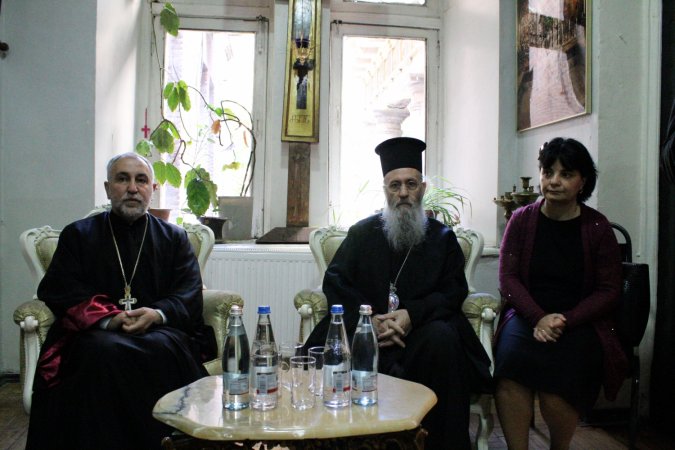On September 18,
His Eminence Hierotheos (Vlachos), Metropolitan of Nafpaktos and
Agios Vlasios (Greece) visited Tbilisi Theological Academy and
Seminary. He delivered a lecture for the students of this
educational institution on the topic: “The Significance of
Theological education and Its Importance in the Contemporary
World.”
Metropolitan
Hierotheos extended his gratitude to the foremost hierarch of the
Church of Georgia – His Holiness and Beatitude Ilia II, on whose
official invitation he had an opportunity to visit Georgia. His
Eminence thanked the Rector of Tbilisi Theological Academy and
Seminary, Protopresbyter Giorgi Zviadadze for having invited him to
this institution and also the head of the Department of History of
the Church and Ascetics, Archpriest Maxim Chanturia, whose support
promoted the translation into Georgian of his books (translator –
Eka Dughashvili) and their publication by the Publishing House “New
Iviron”. The guest said that he would be speaking from his heart
and not according to a drawn up plan.
The following is a
short annotation of Metropolitan Hierotheos’s lecture: “There are
various theologies. How should we draw a line between the true
theology and the others? To attain this objective, one needs a
thorough knowledge of theology. And still, what is Orthodox
theology? Who is a real theologian? – The one, who sees and
contemplates God and renders in words i.e. in written form the
Truth which he has learned through his spiritual experience, is a
real theologian. Theology is not a conceptualization and
presumption about God, rather it is the revelation of God in a
human being.
Theology is also a
science. As in the other sciences, here also, the Teaching on God
is described after a careful observation and study; through this
logic, theologians are prophets, Apostles, Holy Fathers… They
described their spiritual experience. The prophets of the Old
Testament contemplated the Incarnate Son of God prior to His
Incarnation but the Apostles of the New Testament saw the Lord as
already incarnated and made man. The Apostles wrote about the
Incarnate God, the “Word” of the Old Testament who assumed flesh.
This is the most profound connection between the Old and the New
Testaments.
Many Christian
heresies have evolved through heresiarchs’ discourses in which they
employed solely philosophical categories, i.e. visualizing the
material beginning in everything. Especially, great was the
influence of Aristotle.
When Saint Gregory
of Nyssa was asked who was a real theologian, he responded with his
writing “The Life of Moses”. Moses contemplated God, he received
Ten Commandments on Mount Sinai. The 40 days spent there were for
him physical and likewise spiritual experience. Moses did not see
God with his physical eyes, it was his inward experience; as Saint
Gregory puts it – Moses is the first theologian.
There are three
categories of human beings:
1. Those who hear God’s
word;
2. Those who understand God’s
word and;
3. Those who see God’s Kingdom,
the latter being a contemplation of the Uncreated Light.
On Mount Tabor, the
Old Testament prophets Moses and Elijah and the three Apostles of
Christ – Peter, James and John were the witnesses of the Saviour’s
Transfiguration. While reading the epistles of Peter and John, one
clearly sees that they are speaking not about myths but about the
Person whom they saw face-to-face and talked to.





